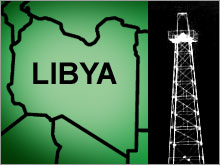|
Tapping into Libya's oil
Normalized relations with Tripoli could land U.S. firms big contracts, countering problems in Latin America and elsewhere.
NEW YORK (CNNMoney.com) - Normal diplomatic relations between the U.S. and Libya could result in more contracts for American oil companies, just when it's getting harder to do business in some Latin American countries. While last week's move normalizing relations with Libya was expected and didn't have an immediate impact on crude prices in New York, experts say it's an added bonus to the lifting of economic sanctions against the country back in 2004.
"When it comes to oil, it's all politics," said Fadel Gheit, an energy analyst with Oppenheimer in New York. "If Gadhafi comes to the White House, count the number of days until a contract is landed by Halliburton or Exxon." In terms of total oil production, Libya is not one of the heavyweights. Its current 1.6 million barrels a day in production places it at No. 16 worldwide, compared to No. 1 Saudi Arabia's pumping capacity of 9.5 million, according to the CIA. But it has the 10 biggest reserves, and both the Department of Energy and Libya itself predict the country could once again produce 3 million barrels a day, putting it in a league with Venezuela. Moreover, most of the country's oil is of high quality - meaning it's light and easy to refine - and just a hop away from major refineries in Italy and elsewhere in southern Europe. Libya is banking that investment and new technologies from Western countries will help jump start its oil industry. Despite a United Nations economic embargo enacted in 1992 - after the country was implicated in the 1988 Pan American Flight 103 bombing over Lockerbie, Scotland - Gheit said Libya was still able to get its oil to Western markets, mostly by first selling it in intermediary countries that didn't abide by the sanctions. Getting technology
But obtaining new technology was difficult and expensive, as it needed to be purchased on the black market. Now, in addition to the restoration of full diplomatic relations, Libya is also being dropped from the U.S. list of countries that sponsor terrorism. That means Libya, and companies that do business there, are free to bring in items that could have duel military and civilian uses, like explosives used in the drilling process. It also makes Libyan ventures more palpable for U.S. companies, who must answer to their shareholding public. "The terrorist state label is not something that is helpful," said Charles Esser, an economist at the Department of Energy. "Getting rid of that is certainly good for investment." And it couldn't come at a better time. On Thursday Occidental (Research), a U.S. oil firm, saw the Ecuadorian government take full control of its operations following a long running dispute over the sale of an oil field. This comes after Bolivia's newly elected president Evo Morales recently nationalized the country's oil and gas industries, requiring foreign firms to sign up to new, higher-taxed contracts if they want to stay and play ball. And the same day the U.S. patched things over with Libya it put Venezuela, the world's No. 10 oil producer and the fourth largest exporter to the U.S., on a list of countries that it said wasn't cooperating in the war on terror. The action does nothing to affect oil imports, but it's the latest in a long running and escalating dispute between the country's left-leaning President Hugo Chavez and the U.S. government. Chavez has reportedly called Bush genocidal and has urged the world to unite against the "imperialist" U.S., while Washington has been accused of complicity in a coup to overthrow the democratically elected Venezuelan leader. Just this past week Chavez traveled to fellow OPEC nations Algeria and Libya to sign trade agreements and hold talks with their leaders. "Chavez is on a war path with the U.S.," said Gheit, who wondered why the American government seemed so bent on antagonizing a man generally not considered to be a ruthless dictator. "He's really trying to tilt OPEC from being closer to the U.S. to being closer to the opposition." ________________ How hedge funds, traders, and Big Oil are really driving gas prices. Click here
Gas prices: No relief in sight. Click here |
|


